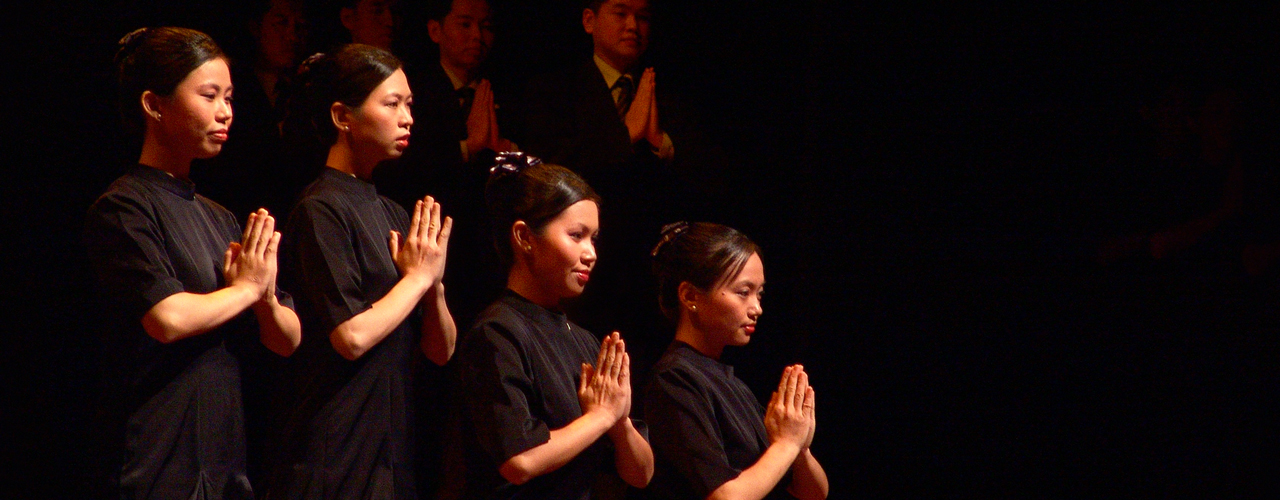Tzu Chi Singapore also started publishing its own Chinese Singapore Tzu Chi World Journal the following year after its setup. In 2001, the first bilingual edition of the journal was published. Its contents mainly focused on the teachings of Master Cheng Yen, reports on Tzu Chi’s activities, notices of upcoming activities, etc. Between 1996 to 1999, the Singapore chapter operated the Tzu Chi Cultural Centre, which assisted in the translation of books and video subtitles into English and Simplified Chinese, in order to reach out to more local audiences.
Mission of Humanistic Culture
Purifying human hearts and bringing infinite joy to humanity
It is indeed very challenging to reach out to the vast number of sentient beings in my limited lifespan. However, if we are able to leverage on the strength of teamwork and advanced modern technology, we will be able to effectively propagate the truthful teachings of the Buddha far and wide.”
Guiding people to the path of truth and goodness
Tzu Chi’s Mission of Humanistic Culture operates on the principle of seeking the ideals of truth, beauty, and goodness, and aims to bear witness to the spirit of human goodness in history. The Tzu Chi Monthly journal began as a simple newsletter in 1967, which published the records of donations received from the public. It was also a faithful bearer of articles expounding the Dharma and of stories that highlighted good deeds and kind acts of people. These inspiring articles and news stories were the beginning of the Mission of Humanistic Culture. Today, the Mission continues to propagate humanistic values through a variety of media channels, including print, Internet radio, TV and multimedia. Apart from honest, truthful reporting, these various media provide guidance and direction, leading people towards the path of goodness.

Tzu Chi Taiwan’s print media is widely recognised by community at large. Both the Tzu Chi Monthly and the Rhythms Monthly periodicals have earned the prestige of being regarded as Taiwan’s equivalent of the National Geographic magazine. They have received the Golden Tripod Award (the highest honour in the Taiwanese publishing industry) multiple times and won other accolades for their outstanding content.
Besides Chinese publications, Tzu Chi also publishes English and Japanese periodicals. The Foundation’s offices in countries, such as the US, Malaysia, Indonesia, etc. have localised publications that share inspiring news and real life stories of human goodness and compassion with a variety of local audiences.

In the 1990s, Tzu Chi Taiwan’s Mission of Humanistic Culture expanded its reach from print media towards the development of 3D media. At the time, Dharma Master Cheng Yen deeply felt the significant influence of the mass media on hearts and minds, and realised the urgent need of a positive media influence in people’s lives. Thus, she established the Da Ai TV Station (“Da Ai” means “great love” in Mandarin Chinese).
With providing truthful reporting as its aim, Da Ai TV station broke away from the media industry’s traditions by not stressing on viewer ratings nor soliciting any commercial advertisements. About a quarter of the TV station’s operating costs is covered by the proceeds from the sale of recyclables collected by Tzu Chi volunteers across Taiwan. Since its inception until today, the TV station has garnered 41 prestigious Golden Bell Awards (Taiwan’s equivalent of the Emmy Awards), as well as a host of other local and overseas awards that affirmed the quality of its programmes.

In order to speedily relay local news to Da Ai TV in Taiwan, Tzu Chi Singapore took a bold step beyond print media and established a video team in 1998. In the light of rapid advancement in multimedia and smartphone technologies during the recent years, Tzu Chi Singapore also started a Facebook page, YouTube channel, Instagram, Telegram channel and Linkedin page in addition to its Chinese and English websites.
Touched by the call of Master Cheng Yen, many volunteers contributed their talents in writing, translation, photography, videography, art and decor, etc., to help spread the messages and spirit of Great Love to the masses. As of today, there are thousands of Tzu Chi media volunteers around the world, working to provide real-time news updates and to record Tzu Chi’s activities worldwide.


Humanistic values come from the heart. As the ancient saying goes, ‘Man is innately good.’ Within each person, there is a true, innate nature that the Dharma speaks of. To engage in spiritual practice, we need such a humanistic quality, too. It is the sincerity that arises from an honest heart, and also the sincerity between people. It comes from within the heart before being manifested outwardly.”
On a mission to spread humanistic values
Dharma Master Cheng Yen witnessed the increasing prevalence of social disorder, as well as the disturbing phenomenon of every passing fad and fashion trend being seen as a “culture”. Thus in 2004, she made the decisive call to change the “Mission of Culture” to the “Mission of Humanistic Culture”, to encourage the people of Tzu Chi to serve as exemplary models in society so that such real life stories about humanity’s beauty and goodness can be passed on to posterity.
In the fast-paced, modern city-state of Singapore, Tzu Chi has, over the years, held cultural performances, inspiring talks, themed exhibitions, etc. Members of the public were invited to participate in these events, which allowed them to quieten their minds and discover their inner spiritual qualities.
The Mission of Humanistic Culture bears the important missions of “purifying the mind”, “bringing about harmony in society”, “making known the suffering of people around the world”, and “setting right the minds of the wayward and the deluded”. The three Missions of Charity, Medicine, and Education all share the common goals of improving the quality of people’s lives, purifying hearts and minds, and bringing light and hope to humanity. As such, all the Four Missions of Tzu Chi embody humanistic values.




